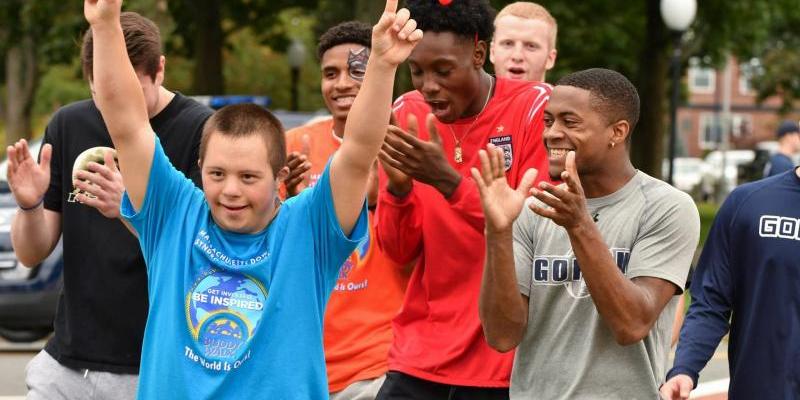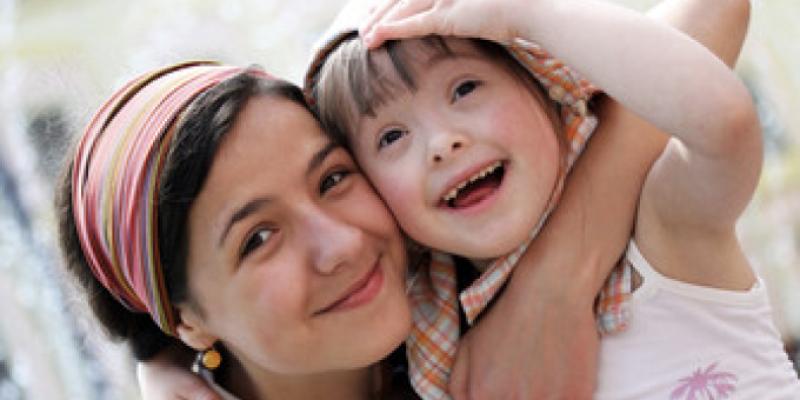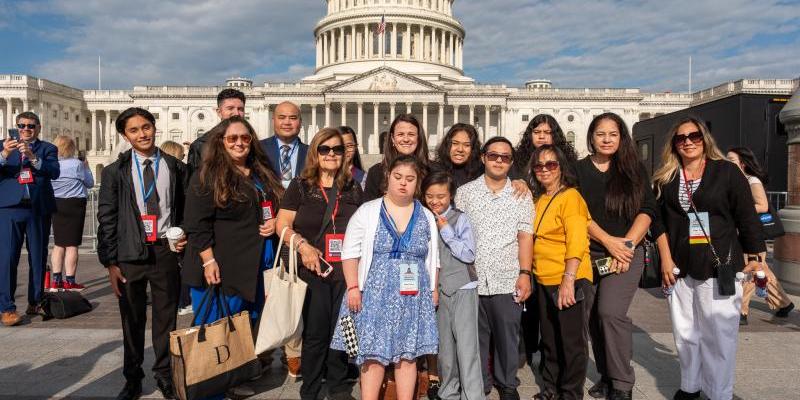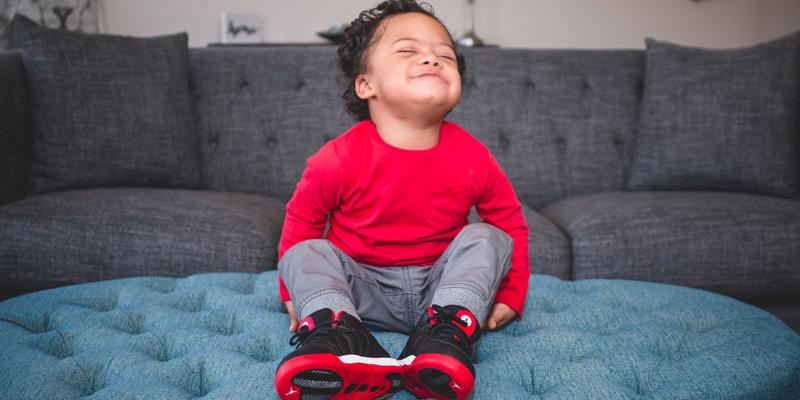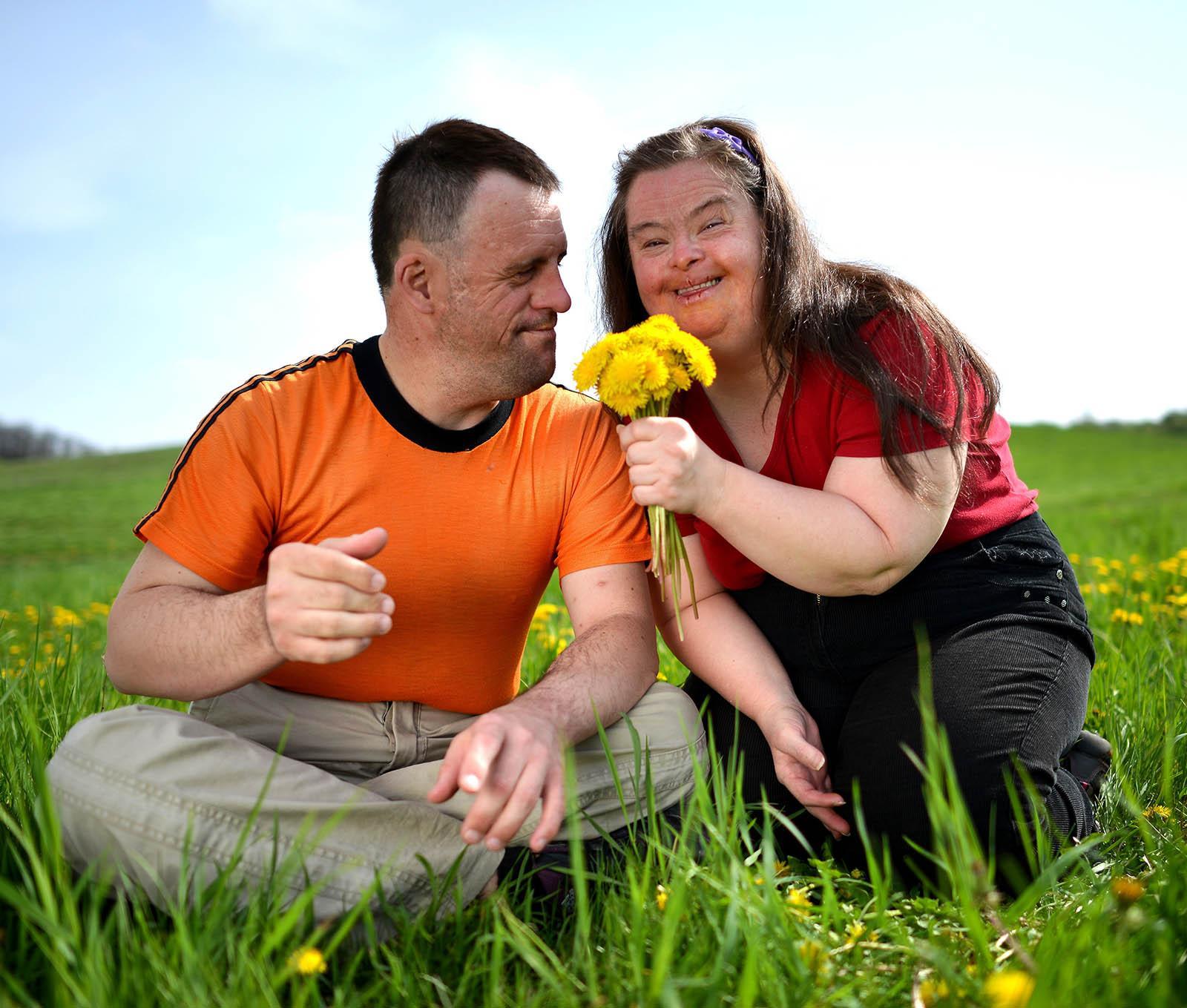
Meaningful relationships include both romantic and social relationships, like friendships.
Relationships are important to help individuals explore and develop social and emotional skills. Human sexuality is about how a person feels about themselves, their relationships with others, and social experiences related to any type of relationships including friendship, co-workers, romantic or intimate. It’s important for people with Down syndrome and other disabilities to learn about these topics in ways that are accessible to them.
Sexuality
Individuals with Down syndrome can have many kinds of relationships, including romantic and intimate ones. Learning about sexuality and relationships can help your loved one feel confident and supported as they build close connections with others.
Importance of Sexuality Education
Sexuality education empowers people to make informed and healthy choices about their bodies and their relationships.1 Sexuality education is important to:
- Help people understand their bodies
- Reduce the risk of sexual abuse
- Avoid sexual misunderstandings
- Prevent STIs
Many individuals with intellectual and development disabilities (IDD) do not have access to sexuality education. This may increase their risk for sexual abuse. Sexuality education for individuals with IDD can help teach them how to set boundaries, identify when they may be at risk, and learn how to ask for help.2,3
People who support individuals with IDD may also benefit from accessing sexuality education resources. Please see the resources below for parent specific guides on sexuality education. Parent involvement in sexuality education among individuals with IDD can:
- Improve parental attitudes about sexuality
- Reduce negative attitudes and barriers
- Increase conversations about sexuality among self-advocates, families, and professionals in the field.
Additionally, educating teachers, paid support staff, and healthcare professionals about the importance of sexuality education for individuals with IDD can help reduce stigma, reinforce social boundaries, encourage appropriate behavior across settings, and create meaningful opportunities for skill-building. Please see the resources below for sexuality education guides for teachers and support staff.
Physical and Emotional Development
Understanding physical and emotional development is an essential part of comprehensive sexuality education. Physical development refers to any growth and bodily changes that happen to children as they age, and emotional development refers to how children interact and form relationships with others.
Children with Down syndrome experience puberty similarly to children in the general population but may experience it a little later.4 Despite slightly delayed puberty in girls with Down syndrome, girls may begin menstruation a little earlier before the general population.
Individuals with Down syndrome experience reduced fertility, but pregnancy is still possible.5,6 If your loved one would like to prevent pregnancy, contraceptive options like condoms or birth control are available. If you and your loved one are interested in learning more about contraceptive options, please talk with your clinician and refer to the Women’s Health & Down Syndrome webpage.
Youth with Down syndrome experience emotional development like their typically developing peers but may experience differences in self-control, communication, abstract thinking, and problem-solving abilities. Like all teens, they may go through mood changes and new feelings.
Teenagers and young adults with Down syndrome often show interest in dating, marriage, and parenthood. They may also need support and acceptance in exploring gender identity and sexual orientation to increase opportunities for healthy sexual expression. Please see the additional resources below for materials on how to support your loved one in exploring their gender identity and sexual orientation.
Sexually Transmitted Infections (STIs)
STIs are less common in individuals with Down syndrome. However, individuals with Down syndrome can still be at risk for STIs from consensual sexual activity or sexual abuse.
Getting tested for STIs is helpful to identify if someone has been exposed. You can decide if your loved one should be tested for STIs by discussing concerns or symptoms with a healthcare professional. The best way to protect against STIs is by using condoms or barriers like dental dams. Please see the resources below for some materials on how to use condoms, which can be shared with your loved one with Down syndrome.
Consent
Consent is about using clear communication to identify boundaries in various types of situations, including friendships, romantic relationships, and being sexually active. It is important that individuals with Down syndrome know how to ask, give, interpret, and respect consent in their relationships.
Asking for consent allows individuals with Down syndrome to learn how to identify others’ boundaries. Similarly, giving consent allows for individuals with Down syndrome to practice boundary setting with others.
Two key aspects of consent include information and choice. Your loved one needs to know enough about sex, reproduction, and how to communicate their boundaries to make informed decisions about being sexually active. They should also feel empowered and confident to decide which types of contact make them comfortable.
Due to the limited opportunities for sexuality education, individuals with Down syndrome may not know the vocabulary used to talk about consent. You can help your loved one understand the language around sexual activity and consent by practicing asking and giving consent. For example:
Asking for consent can look like, “Is this okay?” or “Can I...?”
Giving consent can look like saying, “Yes” or “I’m okay with that”
Promoting Meaningful Relationships
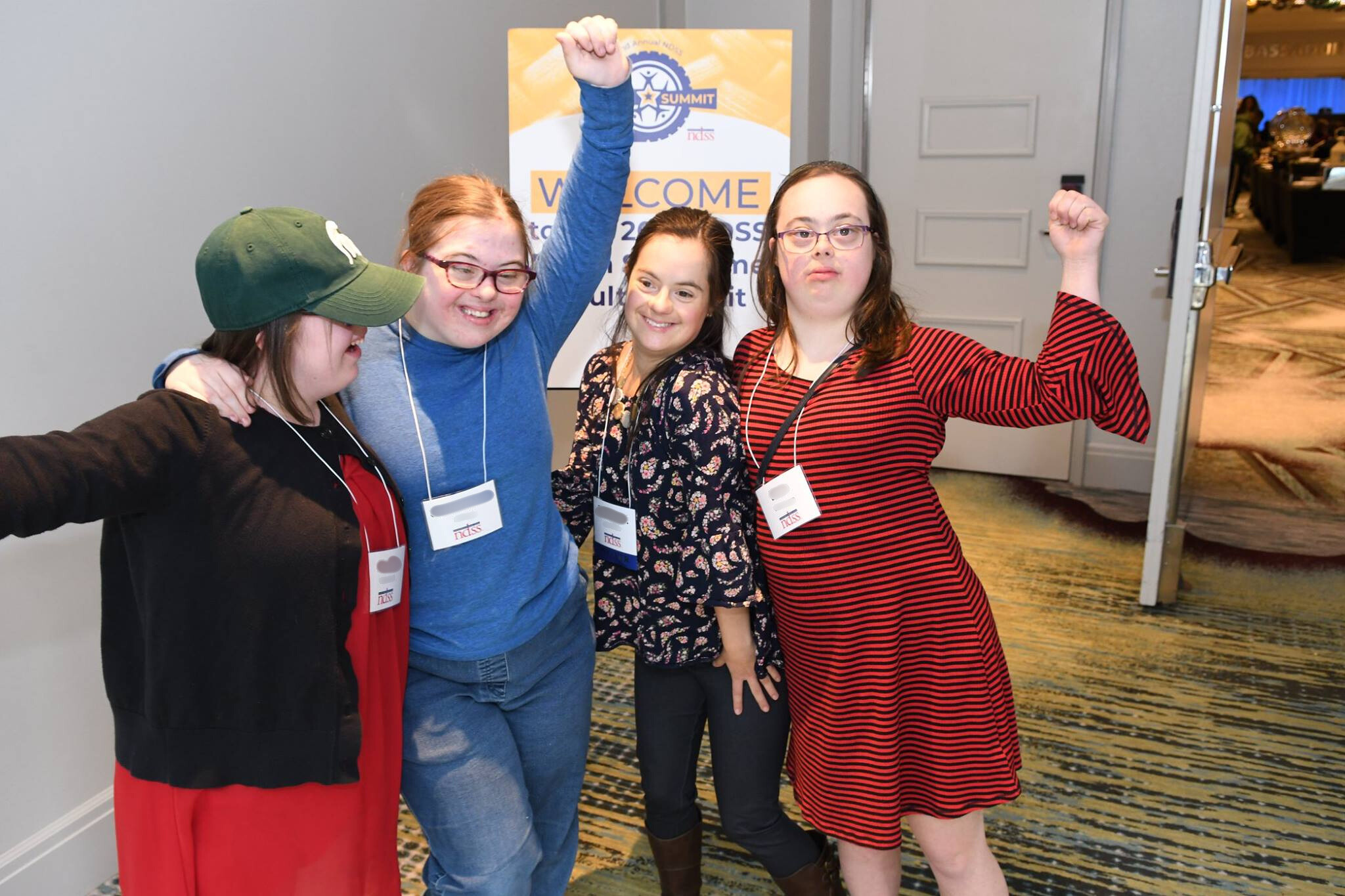
Meaningful relationships are the romantic and social relationships individuals can form with others. Encouraging opportunities to seek meaningful relationships are important for your loved one to explore and develop social and emotional skills. Even though there are many benefits, individuals with Down syndrome often face barriers when exploring meaningful relationships.
You can support your loved one in learning more about relationships and sexuality by reviewing educational resources like social stories. Social stories use words and images to explain social situations, experiences, or skills your loved one may come across. You can use social stories to explain friendships and romantic relationships, consent, how to plan a date, and how to handle rejection. Please see the additional resources below for social stories you and loved one can look at together.
Benefits of Meaningful Relationships
There are many benefits of meaningful relationships for individuals with IDD. Close personal relationships can help your loved one feel more confident, improve their social and emotional skills, and prepare your loved one for a variety of experiences. Other important benefits include:
- Lower risk of abuse: When individuals with IDD have the opportunity to develop meaningful relationships, they are better at identifying appropriate and healthy social relationships and practice related behaviors.7 This can help them identify which relationships or actions are inappropriate and report them to a caregiver or a trusted adult.
- Decreased feelings of loneliness: Individuals with IDD experience a high rate of loneliness and these feelings may be heightened by limited social or romantic relationships. Supporting your loved one in forming relationships can help them feel more confident in seeking relationships, and their feelings of loneliness may decrease.
- Better health and well-being: Companionship can support the mental health of individuals with IDD by reducing the risk of depression.8 Additionally, meaningful relationships and community involvement can support physical health among individuals with IDD by reducing heart disease risk.9 Supporting and creating opportunities for meaningful relationships can lead to positive benefits to the health and well-being of individuals with Down syndrome along with their families and caregivers.
- More job and community opportunities: When people practice relationship and social skills, they also learn things like setting boundaries and understanding what behaviors are appropriate in public settings compared to private settings. These skills can help them succeed at work and in their communities.
Barriers to Meaningful Relationships
Even though there are many benefits of meaningful relationships, individuals with IDD face challenges exploring meaningful social and romantic relationships. Examples of barriers include:
- Lack of privacy and opportunities: Sometimes, people with IDD do not get enough chances to build relationships. If they do not have privacy or freedom, they may show affection in public in ways that others see as inappropriate. This can lead to more rules, more supervision, and even less privacy, which can be confusing. Support from parents and caregivers is very important in helping people with Down syndrome form meaningful relationships.
- Negative attitudes: Negative attitudes from others about the sexuality of individuals with IDD can lead to limits and rules placed on sexual or romantic expression. The opinions of caregivers, the public, and other individuals around your loved one about sexuality and relationships can affect how an individual with Down syndrome sees themselves and their choices.
- Lack of sexuality education: Many people with IDD do not receive enough education about sexuality, sexual health, sexual rights, and relationship building. Without this education, they might learn inaccurate information from online or their peers. This can make it harder for individuals with Down syndrome to explore relationships safely and can increase their risk for abuse.
Learning how to form and maintain friendships can help your loved one build social and emotional skills which are important parts of meaningful relationships. For more information on how to support your loved one in forming positive social relationships, please refer to the Friendships & Social Relationships webpage.
Prevention of Sexual Abuse
Risk
As previously mentioned, individuals with IDD have an increased risk of sexual abuse than those without disabilities. Understanding the risk of abuse and knowing the warning signs are important to help protect your loved one.
Individuals with Down syndrome may experience increased vulnerability for sexual abuse when:10
- Feeling lonely
- Having a limited perception of healthy relationships
- Having underdeveloped emotional or social skills
- Experiencing a lack of stimulating activities
Sometimes, a person might be involved in an inappropriate relationship because they are looking for friends, interesting experiences, sensory and mental stimulation, and a positive sense of self.
Individuals with IDD who have experienced sexual abuse may face barriers when attempting to report abuse. This may include communication difficulties, fear of abandonment, not being believed or being blamed, and feelings of guilt.2,11
Another factor that may increase the risk for sexual abuse for individuals with Down syndrome is overprotection, which can lead to unintended limitation of choice or rights. For example, avoiding discussing topics related to sexuality is a form of overprotection that can limit the education people with Down syndrome receive regarding building healthy relationships, leaving them vulnerable to tolerating unhealthy relationships and/or experiencing abuse.12
Additionally, limited sexual rights can have negative effects in areas such as:13
- Gender identity
- Friendships
- Self-esteem
- Body image and awareness
- Emotional growth
- Social behavior
By supporting your loved one’s rights for sexual expression and social relationships, you can help them identify their values, boundaries, and rights in various situations. Some ways you can support your loved one explore their sexual rights and social relationships include:
- Using educational resources to help them make informed decisions about safe sex practices, sexual orientation, and relationships
- Creating opportunities to make friendships and be social
- Practicing how to set and respect boundaries
Warning Signs
Knowing the warning signs and symptoms of sexual abuse is critical to help prevent abuse among individuals with Down syndrome.
- Physical warning signs of sexual abuse may include the following:
- Bleeding or injury around the private areas of the individual’s body
- A sexually transmitted infection
- A urinary tract infection
- Loss of bladder control
- Hygiene issues
- Pregnancy
Some signs may be harder to notice and can be similar to reactions to other types of stress or trauma. Behavioral or psychological warning signs of sexual abuse may include the following:
- Dramatic shifts in sleep, eating, weight, or mood
- Depression
- Regression to infantile behaviors
- Self-injurious behaviors
- Voluntary mutism
- Fear of a specific person or setting
- Aggression
- Withdrawal from social activity
If you suspect that your loved one has experienced sexual abuse, it is important to listen, affirm, and reassure your loved one that they are not at fault and have nothing to be embarrassed about.
Make a report to the appropriate organization, agency, or person depending on your state. This could be law enforcement, social services, school professionals, or healthcare professionals. For further guidance, please refer to organizations such as RAINN (Rape, Abuse & Incest National Network), National Alliance to End Sexual Violence, and National Sexual Violence Resource Center.
Prevention
Individuals with Down syndrome can learn skills that help protect them from sexual abuse. These skills include:7
- Setting boundaries
- Being assertive
- Knowing their rights
- Understanding safe and healthy relationships
- Learning how to report a concern
It’s important to start teaching these skills in childhood and continue through adulthood. This gives people with Down syndrome the tools they need to stay safe and make their own choices.
Learning what kinds of physical touch are appropriate and knowing when to ask for help is very important to help individuals with Down syndrome develop independence and feel safe. You and your loved one can practice these skills by:
- Using assertive language to say what they want or don’t want
- Choosing trusted adults to go to if they feel unsafe
Thank you to Leslie Walker-Hirsch, M.Ed., FAAMR, Lindsay Sauve, MPH, Lindsey Catherine Mullis, MS, PhD, and Priya Chandan, MD, MPH, PhD, who provided updates to this webpage.
Resources
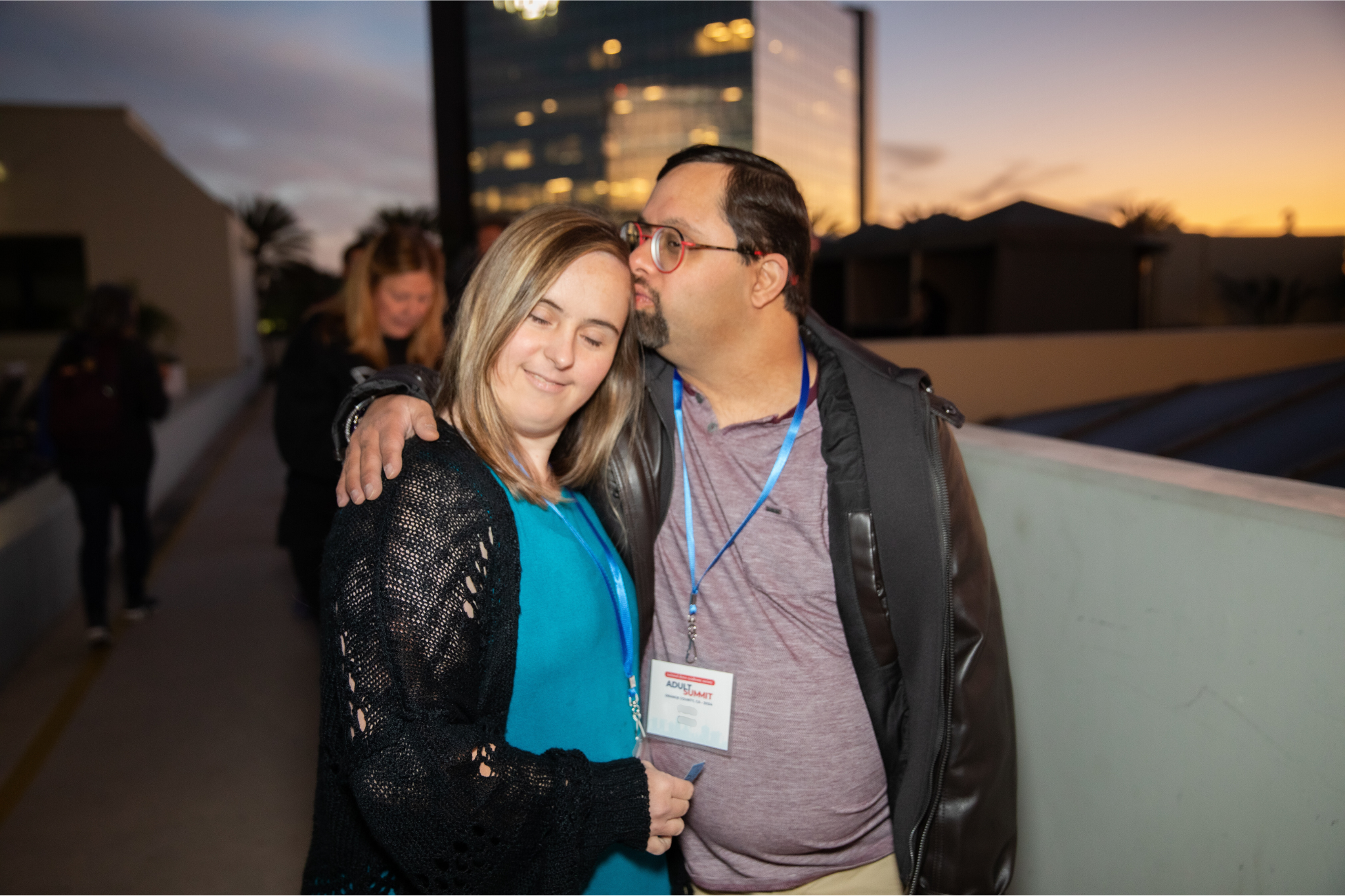
Sexuality Education Resources
You and your loved one can explore sexuality education resources that cover a variety of topics about supporting the sexuality and development of meaningful relationships for individuals with IDD. There are resources available for individuals with Down syndrome and other disabilities, parents, staff, and teachers.
These resources are also categorized by the type of facilitation they use. A facilitator acts as a leader and works with people to help them reach an understanding. Trained facilitation means that the program includes training for someone to lead and support the group. Independent facilitation means that individuals can use the information on their own without needing extra help.
Additionally, these resources cover a range of topics, including boundaries, feelings, gender, healthy relationships, puberty, relationship types, safety, sexual health, and sexual self-advocacy.
Below are resources sorted by audience. Please check out the resources that best fit your needs.
Individuals with Down syndrome or IDD
Down Syndrome Association: Relationships and Sex
- Type: Guide & Curriculum
- Cost: Free
- Facilitation: Independent
- Topics: Boundaries, Gender, Healthy Relationships, Puberty, Relationship Types, Safety, Sexual Health, and Sexual Self Advocacy
- Type: Curriculum
- Cost: $799+
- Facilitation: Independent
- Topics: Boundaries, Healthy Relationships, Relationship Types
ElevateUs: Sexuality Education for People with Developmental Disabilities
- Type: Curriculum
- Cost: $299+
- Facilitation: Trained or Independent
- Topics: Boundaries, Feelings, Gender, Healthy Relationships, Puberty, Relationship Types, Safety, Sexual Health, Sexual Self Advocacy
Family Life and Sexual Health Special Education curriculum (FLASH)
- Type: Curriculum
- Cost: Free
- Facilitation: Independent
- Topics: Boundaries, Feelings, Healthy Relationships, Puberty, Safety, Sexual Health, Sexual Self Advocacy
Healthy Relationships through Arc of Spokane
- Type: Curriculum
- Cost: Free
- Facilitation: Independent
- Topics: Boundaries, Feelings, Healthy Relationships, Relationship Types, Safety
- Type: Curriculum
- Cost: Free
- Facilitation: Independent
- Topics: Boundaries, Feelings, Healthy Relationships, Safety, Sexual Health, Sexual Self Advocacy
National Council on Independent Living: Sex Ed for People with I/DD
- Type: Videos
- Cost: Free
- Facilitation: Independent
- Topics: Feelings, Gender, Healthy Relationships, Sexual Health, Sexual Self Advocacy
Positive Prevention Plus - Special Education
- Type: Curriculum
- Cost: $399+
- Facilitation: Independent
- Topics: Boundaries, Feelings, Gender, Healthy Relationships, Puberty, Relationship Types, Safety, Sexual Health, Sexual Self Advocacy
- Type: Curriculum
- Cost: $500+
- Facilitation: Trained or Independent
- Topics: Boundaries, Feelings, Gender, Healthy Relationships, Puberty, Relationship Types, Safety, Sexual Health, Sexual Self Advocacy
- Type: Curriculum
- Cost: Free
- Facilitation: Independent
- Topics: Boundaries, Gender, Healthy Relationships, Relationship Types, Safety, Sexual Health, Sexual Self Advocacy
- Type: Guide & Videos
- Cost: Free
- Facilitation: Independent
- Topics: Gender, Healthy Relationships, Safety, Sexual Health, Sexual Self Advocacy
- Type: Guide
- Cost: Free
- Facilitation: Independent
- Topics: Boundaries, Feelings, Gender, Puberty, Safety, Sexual Health, Sexual Self Advocacy
- Type: Videos
- Cost: Free
- Facilitation: Independent
- Topics: Boundaries, Feelings, Gender, Healthy Relationships, Puberty, Relationship Types, Safety, Sexual Health, Sexual Self Advocacy
- Type: Curriculum
- Cost: Free
- Facilitation: Independent
- Topics: Gender, Healthy Relationships, Puberty, Safety, Sexual Health
- Type: Curriculum
- Cost: $430
- Facilitation: Trained or Independent
- Topics: Feelings, Healthy Relationships, Puberty, Relationship Types, Safety, Sexual Health, Sexual Self Advocacy
Caregivers
Down Syndrome Association: Relationships and Sex
- Type: Guide & Curriculum
- Cost: Free
- Facilitation: Independent
- Topics: Boundaries, Gender, Healthy Relationships, Puberty, Relationship Types, Safety, Sexual health, and Sexual Self Advocacy
- Type: Guide
- Cost: Free
- Facilitation: Independent
- Topics: Boundaries, Feelings, Gender, Puberty
Teaching Sexual Health: Teaching Human Sexuality to Students with Differing Abilities
- Type: Curriculum
- Cost: Free
- Facilitation: Trained or Independent
- Topics: Boundaries, Healthy Relationships, Puberty, Relationship Types, Safety, Sexual Health
Sexuality Education for Students with Disabilities
- Type: Guide
- Cost: Free
- Facilitation: Independent
- Topics: Healthy Relationships, Sexual Health, Sexual Self Advocacy
Teen Talk Adapted for All Abilities
- Type: Curriculum
- Cost: $500+
- Facilitation: Trained or Independent
- Topics: Boundaries, Gender, Healthy Relationships, Relationship Types, Sexual Health, Sexual Self Advocacy
Support Staff
ElevateUs: Sexuality Education for People with Developmental Disabilities
- Type: Curriculum
- Cost: $299+
- Facilitation: Trained or Independent
- Topics: Boundaries, Feelings, Gender, Healthy Relationships, Puberty, Relationship Types, Safety, Sexual Health, Sexual Self Advocacy
Sexuality Education for Students with Disabilities
- Type: Guide
- Cost: Free
- Facilitation: Independent
- Topics: Healthy Relationships, Sexual Health, Sexual Self Advocacy
Teen Talk Adapted for All Abilities
- Type: Curriculum
- Cost: $500+
- Facilitation: Trained or Independent
- Topics: Boundaries, Gender, Healthy Relationships, Relationship Types, Sexual Health, Sexual Self Advocacy
Educators
- Type: Curriculum
- Cost: $799+
- Facilitation: Independent
- Topics: Boundaries, Healthy Relationships, Relationship Types
Down Syndrome Association: Relationships and Sex
- Type: Guide & Curriculum
- Cost: Free
- Facilitation: Independent
- Topics: Boundaries, Gender, Healthy Relationships, Puberty, Relationship Types, Safety, Sexual health, and Sexual Self Advocacy
Family Life and Sexual Health Special Education curriculum (FLASH)
- Type: Curriculum
- Cost: Free
- Facilitation: Independent
- Topics: Boundaries, Gender, Healthy Relationships, Puberty, Safety, Sexual Health, Sexual Self Advocacy
Positive Prevention Plus - Special Education
- Type: Curriculum
- Cost: $329
- Facilitation: Independent
- Topics: Boundaries, Feelings, Gender, Healthy Relationships, Puberty, Relationship Types, Safety, Sexual Health, Sexual Self Advocacy
- Type: Curriculum
- Cost: Free
- Facilitation: Independent
- Topics: Boundaries, Healthy Relationships, Puberty, Relationship Types, Sexual Health, Sexual Self Advocacy
- Type: Curriculum
- Cost: $375+
- Facilitation: Trained or Independent
- Topics: Boundaries, Feelings, Gender, Healthy Relationships, Puberty, Relationship Types, Safety, Sexual Health, Sexual Self Advocacy
Teaching Sexual Health: Teaching Human Sexuality to Students with Differing Abilities
- Type: Curriculum
- Cost: Free
- Facilitation: Trained or Independent
- Topics: Boundaries, Healthy Relationships, Puberty, Relationship Types, Safety, Sexual Health
Teen Talk Adapted for All Abilities
- Type: Curriculum
- Cost: $500+
- Facilitation: Trained or Independent
- Topics: Boundaries, Gender, Healthy Relationships, Relationship Types, Sexual Health, Sexual Self Advocacy
Additional Resources
External Resources
- Advocate Medical Group: Adult Down Syndrome Center
Offers various social stories, visuals, and additional resources about health and well-being for individuals with Down syndrome, including sexual health and relationships. - American Association of Sexuality Educators, Counselors and Therapists (AASECT)
Promotes an understanding of human sexuality and healthy sexual behavior; website contains a searchable list of certified professionals - American Association on Intellectual and Developmental Disabilities
Contains articles on sexuality and intellectual disability - Center for Parent Resources (CPIR)
Offers information on pre-adolescents and teens with disabilities - U.S. Centers for Disease Control and Prevention (CDC)
Contains information on condom use and types of condoms - Down to Defend
Educates and equips individuals with IDD by providing safety classes and resources - Friendship Resources
Educates individuals with Down syndrome on how to maintain healthy friendships - Green Mountain Self-Advocates
Contains articles about exploring gender identity, sexual orientation, relationships as individuals with disabilities - Impact: Feature Issue on Sexuality and People with Intellectual, Developmental and Other Disabilities
Contains articles offering perspectives and information; published by the Institute on Community Integration, University of Minnesota - Leslie Walker-Hirsch, M. Ed., FAAIDD
Creator of the Circles program of teaching social boundaries to individuals with intellectual disabilities - Planet Puberty
Helps caregivers and children with intellectual and developmental disabilities navigate puberty - Planned Parenthood Federation of America
Often supports, through affiliates, educators trained to design and implement sexuality programming for individuals with intellectual disabilities - Sexuality Information and Education Council of the United States (SIECUS)
Provides broad information and advocacy on sexuality issues, sexual health and sexual rights - Sexual Health Network – TSHN
Offers articles and blog posts on disability and sexuality - Worth the Conversation
Provides sexual abuse prevention education to parents and caregivers of children with Down syndrome
References
1. Weber I, Kaufman I. Let's Talk About Sex: Sex and Relationship Education for People with Intellectual Disabilities. Dela J Public Health. 2021;7(2):48-50. Published 2021 Mar 13. doi:10.32481/djph.2021.03.011
2. Gülay A, Eratay E. Perceptions of forensic interviewers on the sexual education of individuals with a disability exposed to sexual victimisation. Journal of Sexual Aggression.:1-15. doi:10.1080/13552600.2024.2421184
3. Lepore-Stevens M. Adapting a human sexuality curriculum for students with disabilities. Health education journal. 2024;83(8):841-854. doi:10.1177/0017896924128044
4. Erdoğan F, Güven A. Is there a secular trend regarding puberty in children with down syndrome? Frontiers in endocrinology (Lausanne). 2022;13. doi:10.3389/fendo.2022.1001985
5. Graham H, Couwenhoven T, Wilson L, et al. Primary Care Provider’s Guide to Women’s Health and Down Syndrome. National Down Syndrome Society; 2024.
6. Alnoman A, Baghlaf HA, Badeghiesh AM, Peeva M, Dahan MH. Pregnancy, delivery, and neonatal outcomes among women living with Down syndrome: a matched cohort study, utilizing a population database. Archives of gynecology and obstetrics. 2024;309(6):2681-2687. doi:10.1007/s00404-023-07208-0
7. Collins J, Murphy GH. Detection and prevention of abuse of adults with intellectual and other developmental disabilities in care services: A systematic review. Journal of applied research in intellectual disabilities. 2022;35(2):338-373. doi:10.1111/jar.12954
8. Alexandra P, Angela H, Ali A. Loneliness in people with intellectual and developmental disorders across the lifespan: A systematic review of prevalence and interventions. Journal of applied research in intellectual disabilities. 2018;31(5):643-658. doi:10.1111/jar.12432
9. Zwack CC, McDonald R, Tursunalieva A, Vasan S, Lambert GW, Lambert EA. Stress and social isolation, and its relationship to cardiovascular risk in young adults with intellectual disability. Disability and rehabilitation. 2023;45(6):974-985. doi:10.1080/09638288.2022.2046186
10. Jojo N, Nattala P, Seshadri S, Krishnakumar P, Thomas S. Knowledge of sexual abuse and resistance ability among children with intellectual disability. Child abuse & neglect. 2023;136. doi:10.1016/j.chiabu.2022.105985
11. Gentile JP, Grant L. Preventing Sexual Assault in Intellectual Disability. Innovations in clinical neuroscience. 2024;21(10-12):15-21.
12. Chandan P, Sauve L, Mullis LC. Meaningful Relationships: A Critical Focus Area for People with Down Syndrome. National Down Syndrome Society; 2021.
13. Sexuality. The Arc. Updated 2021. Accessed August 7, 2025. https://thearc.org/position-statements/sexuality
The information and resources provided herein are for informational purposes only, including those related to health, sexuality, and overall well-being. NDSS is not a healthcare provider, and this information should not be construed as medical advice, sexual health advice, or a substitute for professional guidance. Please consult with your family member’s qualified clinician(s) or other trusted professionals to determine your/their personal healthcare, sexual health, and support needs (if any).

